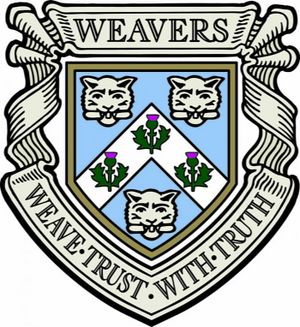Annotation:Deacon of the Weavers: Difference between revisions
Appearance
No edit summary |
No edit summary |
||
| (One intermediate revision by the same user not shown) | |||
| Line 2: | Line 2: | ||
{{TuneAnnotation | {{TuneAnnotation | ||
|f_tune_annotation_title= https://tunearch.org/wiki/Annotation:Deacon_of_the_Weavers > | |f_tune_annotation_title= https://tunearch.org/wiki/Annotation:Deacon_of_the_Weavers > | ||
|f_annotation='''DEACON OF THE WEAVERS'''. Scottish, Reel (whole time). F Major. Standard tuning (fiddle). AAB. Glen (1891) finds the earliest printing of this tune in Robert Bremner's 1768 2nd collection (p. 104). | |f_annotation=[[File:Weaverdeacon.jpg|thumb|right|300px|]]'''DEACON OF THE WEAVERS'''. Scottish, Reel (whole time). F Major. Standard tuning (fiddle). AAB. Glen (1891) finds the earliest printing of this tune in Robert Bremner's 1768 2nd collection (p. 104). Weavers in Scotland were organized in the Middle Ages when members of the craft were those entitled to make and sell woven clothes within the old burghs. In Glasgow, the craft became incorporated by a charter from the famous Archbishop Gavin Dunbar as feudal lord of Glasgow in 1528, but is known to have been in existence at least as far back as 1514. The main function of the guild was to control standards in the weaving trade, with the guild headed by the elected office of deacon. Each trade also elected their own deacons. | ||
<br> | <br> | ||
<br> | <br> | ||
Latest revision as of 03:32, 1 July 2023
X:1 T:Deacon of the Weavers, The M:C L:1/8 R:Reel B:Robert Bremner – “For the year 1769 a collection of scots reels, or country dances” (p. 104) Z:AK/Fiddler’s Companion K:F (A/B/|c)FdF cFdF|cFdA G/G/G G(A/B/|c)FdF cF fd|c>B TA>G F/F/F F2:| (f/g/|a)fdf cfAc|d>cba g/g/g g(f/g/|a)fdf cAdBZ|cfeg f/f/f (ff/g/| a)fdf cfAc|d>cba g/g/g g(f/g/|a)fgd cAfd|c>B TA>G F/F/F F||

There is a Scottish Country Dance called Deacon of the Weavers.

